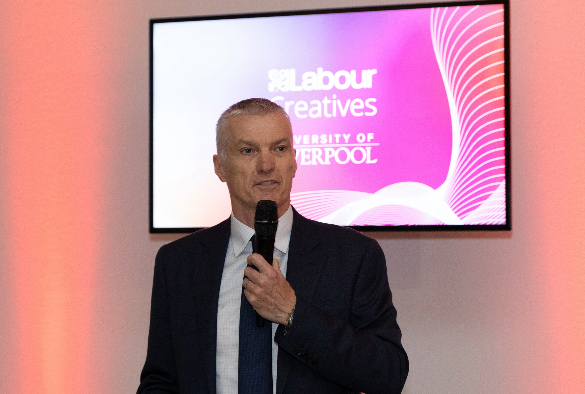
This week the University of Liverpool contributed to and led discussions exploring key societal issues and challenges at the Labour Party Conference.
Topics ranging from digital exclusion, NHS recruitment and the power of the creative industries were discussed by academics from a range of disciplines during the 4-day event in Liverpool.
Events included Levelling up Living Standards – how do we bridge the digital divide? hosted by the University with the N8 and the Royal Society for Arts, Manufactures and Commerce. Here a panel made up of leaders from industry, politics, public sector, civil society, and academia discussed the widening digital gap and how we can level up digital access and skills to close the divide. Panellists included Jennifer Williams, Northern England Correspondent, Financial Times, the University’s Professor Simeon Yates, Professor of Digital Culture, and Steve Rotheram, Mayor of the Liverpool City Region.
Professor Iain Buchan, Chair in Public Health and Clinical Informatics in the Institute of Population Health and Associate Pro-Vice-Chancellor for Innovation, and Sue Jarvis, Co-Director, Heseltine Institute for Public Policy, Practice and Place took part in Health & Prosperity: How can health & life sciences boost inclusive growth? Hosted by the Heseltine Institute and Liverpool Health Partners they were joined by Aileen Jones, Executive Director Investment and Delivery, Liverpool City Region Combined Authority, Vivienne Stern, Chief Executive, UUK, Ian Byrne, MP for Liverpool West Derby and Jan Ross, Chief Executive of The Walton Centre NHS Foundation Trust. Here they examined how we can tackle the NHS recruitment and skills gaps.
Professor Tim Jones, Vice-Chancellor of the University also took part in an event at Tate Liverpool which explored the importance of the creative industries to the UK’s economy. In his opening speech Tim set out the unique role culture and the creative industries have played in Liverpool’s modern renaissance. He highlighted how the University is strongly connected to the creative industries, fully engaging with the city’s rich arts, culture and heritage scene and our School of the Arts providing a pipeline of talent, with more than 2000 undergraduate and postgraduate students, drawn from over 50 countries, studying across a whole range of creative courses.
Tim Jones, Vice-Chancellor of the University of Liverpool said: “A founding mission of the University is to tackle the grand challenges of our age. It was a moment of great pride to see our academics sharing their world-leading expertise to talk on a range of issues that touch the lives of so many. By contributing our knowledge and driving the conversation we can continue to make a positive impact both locally and globally.”